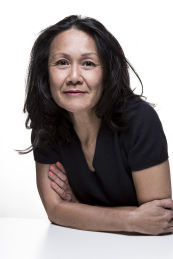2 January 2020
While the entire fashion industry is being challenged and is re-thinking itself and amidst talk of establishing Paris as the capital of sustainable fashion before the Olympic Games in 2024, APLF.com asks Paris-based Fashion Trends Setter and Sustainable Fashion consultant, Anne Liberati of Anne Studio Liberati, how she foresees the future of the industry.

Anne Liberati of Anne Studio Liberati
Q: How did you coin the term « luxtainability » ?
A: It was actually coined by Kering but I like this contraction because it summarizes their approach of merging luxury with sustainability. It illustrates perfectly today’s urgent needs to change production and consumption models. Luxury is no longer the stereotype of the seventies and eighties when it was all about showing off branded items to demonstrate one’s social status. Today, the criteria for luxury are wellbeing, traceability, transparency and social responsibility. These are the new determinants of luxury. Well-being is one of the most underestimated aspects of luxury. When people buy luxuries, they’re also buying an escape from the routine of day-to-day life.
Q: Of all the brands you have been observing which ones do you regard as the most outstanding in terms of sustainability?
A: A few years back Freitag and Patagonia were pioneers in using natural or recycled materials, and offering to repair damaged garments and accessories. More recently, brands like Reformation and Allbirds have followed suit. For example, trendy footwear brand Allbirds has quickly become a millennials’ favorite with a core product dubbed the “comfiest” shoes, which are made of natural materials like merino wool, eucalyptus tree fiber and sugar cane.
On a smaller scale, there is also Recycleather which recycles industrial leather gloves to make small leather accessories as well as OTH (Off the Hook) which recycles car tires and turns them into the soles of trendy sneakers.
To some extent I can also mention H&M Conscious Exclusive collection which features organic materials, recycled wool, Tencel, and recycled sequins. The natural color palette ties perfectly with the environmental theme of the range. Some of its apparel is created from recycled worn clothes – many coming through its collection of customers’ unwanted garments.
What all these brands have in common is that they have incorporated sustainability right from the design of their products, have changed the standard production and distribution processes and have based their story-telling on transparency.
Q: We are increasingly talking about bio-design. How does it affect fashion and how do you foresee the future of it?
A: There are all sorts of emerging ideas from international designers and start-ups for projects that combine biology, design, and technology. However, these projects require a lot of research and considerable financial means that will only give results in the long term. Meanwhile, time is running out and we need immediate solutions.
Q: So what solutions should the fashion industry focus on?
A: Fair sourcing is one of them. Several sourcing platforms such as “Fairly Made”, a sustainable sourcing company providing finished eco-garments for established brands are appearing. “Fairly Made” sources the best fabrics and garment factories in India, China and France and guarantees full transparency to the brands.
Regarding the footwear industry, it is necessary to rationalize production. The IT company Romans Cad has developed a digital shoe production program that optimizes the use of the different materials that make up a shoe. It also intends to set up a database that lists the material data sheets for the sustainable production of shoes, allowing brands to make informed choices.
Q: Are you optimistic about the future?
A: Yes, I am. I have faith in the new materials that are being created and in trends like up-cycling. We are living through a new fashion genesis and like all genesis the integration process is slow. We are in a transition period that requires intelligence, perseverance and above all vigilance. Consumers are increasingly knowledgeable and aware of the negative impact of fashion on the environment and the least “faux pas” from a brand can be fatal to it. Before they buy, consumers study labels and certifications and even check how these have been obtained and audited.
Q: This kind of behavior sometimes leads to constant guilty feelings and we increasingly talk about people suffering from eco-anxiety.
A: yes, one can easily fall into this trap. In fact, it even translates in some fashion trends that we can qualify as “survivalism”, which promote self-sufficiency and autonomy as well as activism and mindfulness. In fact, for the 2020-21 season we foresee the emergence of outdoor gear and clothes inspired from nomadic or neo-military lifestyles as well as the use of accessories inspired from ancestral know-how and handicrafts.
We bring leather, material and fashion businesses together: an opportunity to meet and greet face to face. We bring them from all parts of the world so that they can find fresh partners, discover new customers or suppliers and keep ahead of industry developments.
We organise a number of trade exhibitions which focus on fashion and lifestyle: sectors that are constantly in flux, so visitors and exhibitors alike need to be constantly aware both of the changes around them and those forecast for coming seasons.